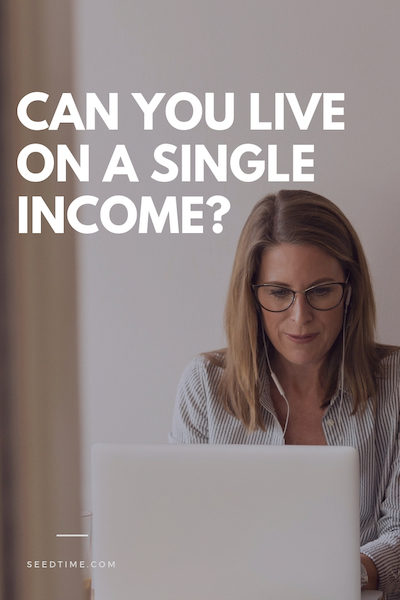
If your household has always survived on at least two paychecks, the thought of living on a single income can be intimidating. It’s tough enough to live on two incomes – but one? It’s actually doable, but it can require a radical plan of action.
Why Live on One Income?
Exactly how you handle this will largely depend on your purpose for living on a single income. There are two basic reasons:
1. To have a stay-at-home parent.
The care of young children or an elderly or disabled loved one is probably the biggest reason couples shift to a single income. This is challenging not only because of the lost income, but also because it comes at a time of rising expenses related to caring for dependents.
2. Live on one income – bank the other.
Couples sometimes opt to live on a single income as a way of improving their financial situation. If you can live on a single income, that frees up the second to pay off debt or to build savings and investments. If you are able to manage to live on a single income, this is one of the best and quickest ways to improve your financial situation. You’re living on one income, and dedicating the second to achieving financial success.
How You Can Live on One Income
If you’ve been living on two incomes for a long time, dropping down to a single paycheck will be a major adjustment. Here are some recommendations that should help the process.
1. The spouse with the higher income should keep working.
In a perfect world, the spouse with the higher income should be the one who continues to work, while the lower paid spouse comes home. In the real world, it’s not always that simple.
If the higher earning spouse does not have benefits, such as health insurance (if you don’t use Medi-Share), and the cost to obtain it is too high, the lower paid spouse may have to be the one to keep working if he or she does have benefits. Another consideration is the ability of either spouse to be able to earn a living by working from home. It may be that the spouse who has this ability is the logical one to come home.
Obviously if the reason for living on one income is simply to dedicate a paycheck to savings and investments, none of these considerations apply.
2. Do a test run.
Going from two incomes down to one is never something that you should do on short notice. You should take several months to do a test run to make sure that it’s workable. Plan on living on a single income for at least six months, while you still have the benefit of the second income. If you find that you can’t do it, you will have time and money to make other arrangements.
3. During the test run, save money and pay off debt.
The test run should actually have two purposes. The first is to see if you can live on a single paycheck, the second is to give you time to prepare your finances for the change.
While you are living on a single income, the second income should be used to pay off debts and to save money. At a minimum, you should pay off your credit cards. This will not only eliminate some monthly expenses, but it will free up your credit lines for other purposes should they be needed when the second income is gone. Also give serious consideration to paying off any car loans, as those are large monthly expenses.
Once you pay off debts, concentrate on putting money away for savings. Since you’ll be living on a single paycheck, you should get an emergency fund with at least six months worth of living expenses in it. The loss of a job by the primary breadwinner is more severe than it is in the two income household. Anything saved beyond this will only help your cause.
4. Cut your living expenses.
It is vital to understand that life on a single paycheck is radically different than it is with two incomes. It may not be a matter of simply clipping coupons for groceries or eliminating restaurant meals. You may have to consider lowering structural expenses.
We’ve already discussed paying off credit cards and car loans as a way of lowering your expenses, but you may have to go beyond. It’s common for two income households to buy as much house as their combined incomes will allow. But if you’re going to cut back to a single paycheck, you may find that you are unable to afford the house you comfortably purchased when you were both working.
You may have to consider moving to a less expensive home. That will not only lower your basic house payment, but it often lowers related expenses, such as utilities and maintenance costs.
Beyond housing, you may have to purchase only used cars in the future, rather than new. You may have to cut back on vacation plans, entertainment expenses, and any memberships you normally have.
And yes, you may still have to clip coupons and cut back on restaurant meals!
5. The stay-at-home spouse should look into work-at-home.
Maybe the stay-at-home spouse can find some sort of work-at-home arrangement, or start a side business that can be run from home. This can provide at least a little extra income that will enable you to stay out of debt, to continue saving money, and to have money available for extras.
Have you made the conversion from two incomes down to one? What advice would you offer for a couple who were about to make the change?




